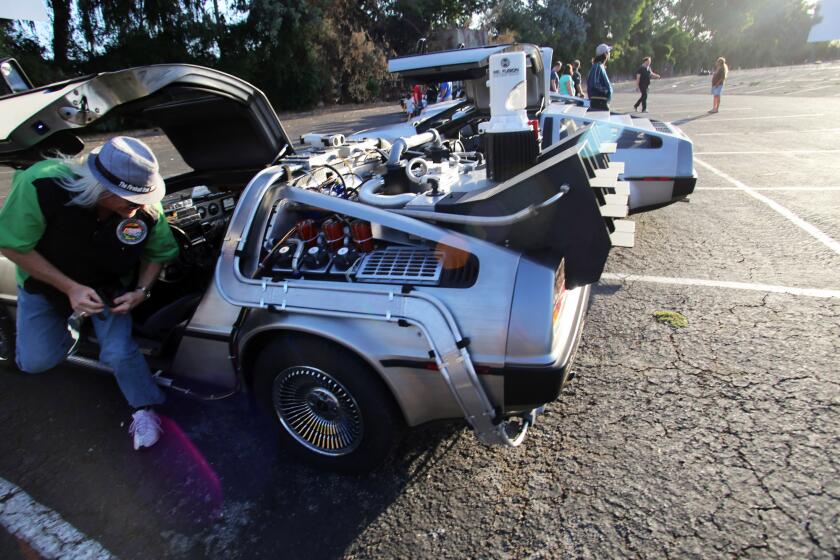Column: Pandemic strengthens resolve at nonprofit that helps vulnerable women
If you’re in need of a break from worrying about the coronavirus pandemic, you might spare a few minutes to learn about an inspiring philanthropic venture that could serve as a practical model for how to make a difference in the world.
In 2004, Shannon Keith was living the good life in Orange County, working in pharmaceutical sales.
Then she went on a trip to India with a church group, and everything changed for her. On that trip, and on another the following year, Keith learned about women and children trapped in a cycle of extreme poverty and sexual slavery.
“It shattered my heart in a thousand pieces,” she said. “I thought, ‘no way can I go back to my cushy life in Orange County. I can do my little part.’”
Keith figured she knew the sales and marketing game. So what if she found a way for these destitute, illiterate women to make products that she could sell, and then they wouldn’t resort to selling their bodies to survive?
A flash of inspiration struck when she noticed women wearing beautiful saris. What if these women she wanted to help were paid to make pajamas and loungewear with the same type of colorful fabric?
Keith felt certain she could sell the apparel. It was a win-win, she thought — a fulfilling business venture for her, and a route to a better life for the women in India.
“I chose a business solution because I’m a businesswoman,” she said.
That’s why she focused on “giving them a job instead of a handout.”
She formed a company, which she named Sudara, the Punjabi word for “beautiful.”
Sudara is structured as a benefit corporation, which is a type of for-profit corporate entity that seeks to make a positive impact on society.
The company, led by Keith, and its nonprofit affiliate, Sudara Freedom Fund, funnel money and resources to partner organizations in India.
Those organizations then train and employ the women to sew the garments — they call the pajama pants “punjammies,” and all the prints are named after women they employ — which are then sold via Sudara’s website.
Keith told me the story of one young woman — a girl, really, just 14 when she first encountered Sudara and its affiliates.
Her father had died of AIDS, and her desperate mother thought the only option to starving was to sell her daughter into the sex trade.
Thanks to Sudara the girl was able to escape that fate, live in a safe home and reenroll in school.
In addition to the seamstress jobs, Sudara helps fund several other vocational training options. About 6,000 women have been trained so far, with a 90% job placement rate in a variety of businesses, including hospitality and call centers.
“Our model is all about job training, creation and placement,” Keith said.
Keith now lives with her husband and three children in Bend, Ore., where she continues to run the business side of the operation, while the nonprofit remains based in Orange County, and is overseen by Glenn Parrish, who has extensive experience leading philanthropic ventures.
Parrish said Sudara is focused not just on finding employment for the women in India, that it also prioritizes building a support network for them.
“It’s not just getting a good job” that makes a difference, he said. “It’s having a community.”
Right now that community, like all others around the world, is under threat due to the coronavirus pandemic.
India announced a countrywide lockdown on March 24, a move that could plunge the nation of 1.3 billion people — already beset with a fragile economy, shaky infrastructure, and widespread poverty — into further despair.
For Sudara, that means the women it’s trying to help are in a particularly precarious position.
Sudara’s nonprofit sent emergency grants to pay the women so they don’t feel compelled to return to abusive situations during the work stoppage.
The company has enough inventory to last a few months, and Keith is exploring options to try to offset the loss of production, including selling other products such as candles on the website.
“I’ve had the gamut of emotions,” Keith said, acknowledging her worries about maintaining the support of the women and children in India through the pandemic.
Yet the crisis has also reinforced for her the purpose of her endeavor.
“What the coronavirus has done is highlighted the fact that as human beings we’re all vulnerable and we need to take care of each other,” she said.
“My resolve is stronger than ever.”
Someday, the coronaviris emergency will be over — or perhaps not over, but under control. Our new normal will evolve into another normal.
Is it too much to wish that when that day comes we’ll have learned some important lessons?
Perhaps one of those lessons is revealed in the selflessness of Keith, who has demonstrated that it’s possible to find a pragmatic, effective way to lift up those in need if one has the passion and determination to see it through.
All the latest on Orange County from Orange County.
Get our free TimesOC newsletter.
You may occasionally receive promotional content from the Daily Pilot.




